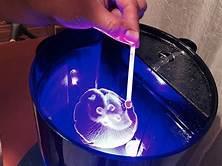Can You Keep a Jellyfish as a Pet?
Jellyfish are fascinating creatures that can make a unique and captivating addition to any home aquarium. However, keeping jellyfish as pets is not without its challenges. Before you decide to bring a jellyfish into your home, it is important to do your research and make sure you are prepared to provide the proper care for this delicate animal.

Jellyfish Biology
Jellyfish are cnidarians, a group of animals that includes sea anemones and coral. They are free-swimming marine animals that have a gelatinous body and long tentacles. Jellyfish come in a variety of colors, shapes, and sizes. Some species are only a few inches across, while others can grow to be several feet in diameter.
Jellyfish are predators and feed on a variety of small organisms, including plankton, shrimp, and fish. They use their tentacles to sting their prey. The tentacles are covered in stinging cells called nematocysts. When a nematocyst comes into contact with an organism, it fires a tiny harpoon-like structure that injects venom into the victim.
Jellyfish as Pets
There are a few species of jellyfish that are commonly kept as pets. These include the moon jellyfish, the crystal jellyfish, and the upside-down jellyfish. These species are relatively hardy and can adapt to life in an aquarium. However, it is important to remember that jellyfish are wild animals and can be dangerous. It is important to take precautions to avoid being stung.
Jellyfish Care
Jellyfish require a specialized aquarium setup in order to thrive. The aquarium should be at least 10 gallons in size, and it should have a filtration system that is rated for a larger aquarium. The water in the aquarium should be kept at a temperature between 68 and 76 degrees Fahrenheit. The pH of the water should be between 8.0 and 8.4. It is also important to provide the jellyfish with a diet of live food, such as brine shrimp or plankton.
Jellyfish Dangers
Jellyfish can be dangerous to humans. The stings of some species can cause severe pain, swelling, and even death. It is important to take precautions to avoid being stung. If you are stung by a jellyfish, seek medical attention immediately.
Conclusion
Jellyfish can make a beautiful and captivating addition to any home aquarium. However, it is important to remember that these animals are wild creatures and can be dangerous. It is important to take precautions to avoid being stung. If you are prepared to provide the proper care for a jellyfish, then you may enjoy having one of these fascinating creatures as a pet.
Declaration: All article resources on this website, unless otherwise specified or labeled, are collected from online resources. If the content on this website infringes on the legitimate rights and interests of the original author, you can contact this website to delete it.



